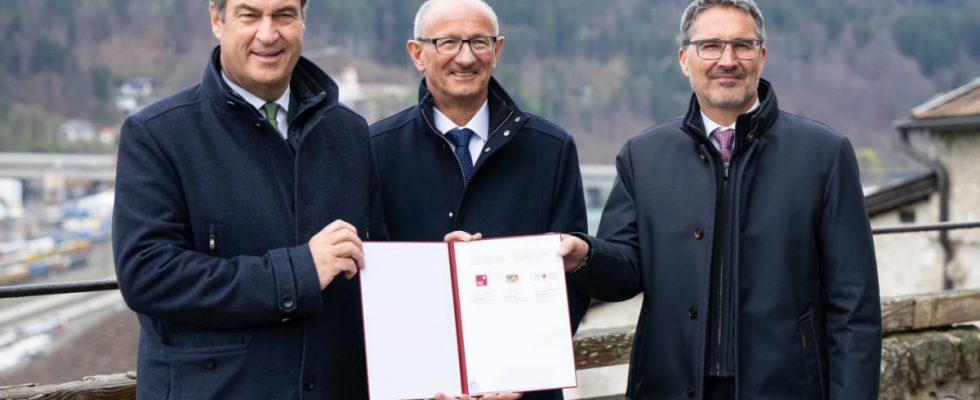When Bavaria’s Prime Minister Markus Söder (CSU), the Tyrolean Governor Anton Mattle (ÖVP) and the South Tyrolean Prime Minister Arno Kompatscher (SVP) meet, then Söder’s formulation is definitely enough for an “Alpine summit”. As far as the subject of their meeting on Wednesday in Kufstein is concerned, namely the ongoing dispute over freight traffic over the Brenner Pass, a solution is still as far away as the main Alpine ridge is from Kufstein Fortress. With their joint declaration signed there, the heads of government of the three federal states want to end the political blockade that has lasted for years – and in the long term also the controversial Tyrolean block handling. They use a digital system of transit rights for trucks as a means of doing this, which, however, could only be introduced at the level of the respective federal government.
“Of course we need Germany, we need Austria and we need Italy,” says host Mattle in Kufstein. Only his own state government could introduce the envisaged slot system for heavy traffic on its own, just as it started block handling on the Inntal autobahn in 2017 after traffic had come to a standstill throughout the state during the main travel season at Pentecost. Since then, Tyrol has slowed down truck traffic on particularly busy days after its weekend, public holiday and night driving bans and only gradually allowed trucks into the country. Bavaria and South Tyrol, where trucks are backed up, consider these “dosages” to be incompatible with EU law, but only the federal governments could file the often threatened lawsuits.
Now the three Alpine federal states want to try cooperation instead. “We had a few years of radio silence. Now we’re sending together again,” says Söder, referring to the recipients in Berlin, Vienna and Rome. Söder’s Tyrolean colleague Mattle, who has been in power since 2021, has so far signaled more willingness to cooperate than his predecessor Günther Platter. “Get creative from being run over,” says South Tyrolean Prime Minister Kompatscher, expressing the hopes on both sides of the Brenner Pass.
Bavaria, Tyrol and South Tyrol are having an “intelligent traffic management system” developed that companies can use to book passages digitally in advance for the entire Brenner corridor to Italy. Mattle and Kompatscher had already presented the idea at the beginning of this year with a feasibility study by the South Tyrolean. In the meantime, a working group from the three countries is working on the basics, which, according to Bavaria’s Minister of Transport Christian Bernreiter (CSU), could be available in late autumn.
Above all, the system should better distribute the many truck trips over the days and weeks. The Tyrolean night driving ban would remain unaffected, although the Bavarian side is hoping for a relaxation. A fixed upper limit for the number of trips has not yet been agreed, but would result from the number of slots. Tyrol has long been pushing for such an upper limit, while Germany, Italy and Bavaria have always emphasized the free movement of goods within the EU. Where the South Tyrolean Kompatscher affirms “that free travel for everyone can no longer work in the medium and long term”, Italy’s Transport Minister Matteo Salvini from the right-wing Lega recently spoke of a lawsuit against block handling. Federal Transport Minister Volker Wissing (FDP), in turn, referred to mediation efforts by the EU Commission, which the three federal states are also hoping for.
The Brenner is “at the moment the truck race track,” says Söder
However, before an agreement is reached on a slot system, for example, no one in the Bavarian state government expects block processing to end. Truck traffic is constantly increasing and the governments involved expect it to continue to do so. In 2000 there were still 1.1 million, according to Mattle, by 2022 – in addition to around eleven million other vehicles – around 2.5 million trucks rolled over the Brenner Pass, a 40 percent share of all truck traffic crossing the Alps. At the same time, the number of truck journeys through Switzerland has recently fallen from 1.4 million to around one million.
The Brenner is “at the moment the truck race track,” says Söder. “We feel that the Brenner needs relief”, for the time being best through “a kind of bookable motorway with slots, as you know it from flying”. In contrast to the landing rights at airports, the burner slots should not have different prices, but none at all. Accordingly, they should not be traded, as could happen, for example, at an Alpine Crossing Exchange called for by various environmental associations.
From the Tyrolean and South Tyrolean point of view, the slot system for trucks could also help to divert freight traffic to rail at some point. Italy and Austria have been building a new Brenner Base Tunnel for a long time, due to be completed in 2032. In Germany, on the other hand, there is no detailed planning for two additional tracks in the direction of the tunnel, but only a rough route, which concerns the residents in the Rosenheim area at least as much as the regular truck traffic jams on the A93.

